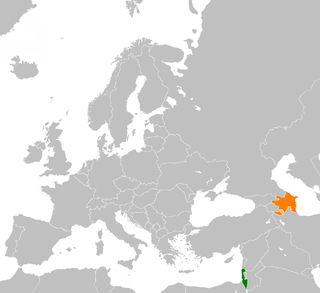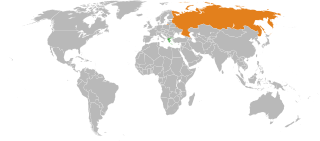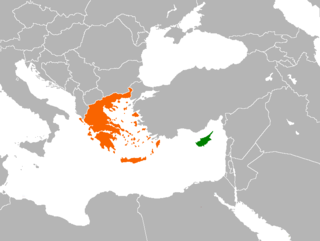Related Research Articles
As one of the oldest Euro-Atlantic member states in the region of Southeast Europe, Greece enjoys a prominent geopolitical role as a middle power, due to its political and geographical proximity to Europe, Asia, the Middle East and Africa. Its main allies are the United States, the United Kingdom, France, Italy, Cyprus and the rest of the European Union and NATO.
The foreign relations of Albania are its relations with other governments and peoples. Foreign relations are conducted through the Ministry of Foreign Affairs in Tirana. The current minister is Igli Hasani. The current Ambassador to the United Nations is Ferit Hoxha.
The foreign relations of Norway are based on the country's membership in NATO and within the workings of the United Nations (UN). Additionally, despite not being a member of the European Union (EU), Norway takes a part in the integration of EU through its membership in the European Economic Area. Norway's foreign ministry includes both the minister of foreign affairs and minister of international development.

Foreign relations of Israel refers to diplomatic and trade relations between Israel and other countries around the world. Israel has diplomatic ties with 164 of the other 192 UN member states as of December 2020. Israel is a member of the United Nations (UN) and a number of other international organisations. Israel maintains full diplomatic relations with two of its Arab neighbours, Egypt and Jordan, after signing peace treaties in 1979 and 1994 respectively. In 2020, Israel signed agreements establishing diplomatic relations with four Arab League countries, Bahrain, the United Arab Emirates, Sudan and Morocco. As of 2021, Israel had formal diplomatic relations with 168 other countries, while twenty-eight UN member states have either never established, or have broken off diplomatic relations with Israel.

Relations between Greece and Turkey began in the 1830s following Greece's formation after its declaration of independence from the Ottoman Empire. Modern relations began when Turkey declared its formation in 1923 following the defeat of the Ottoman Empire in World War I.

Due to the strong historical, political, cultural and religious ties between them, Greece and the United States today enjoy excellent diplomatic relations and consider each other an ally. Today Greece is one of the United States's closest allies.

Azerbaijan and Israel began diplomatic relations in 1992 following Azerbaijan's independence from the Soviet Union. Azerbaijan is one of the majority Muslim countries, alongside Turkey, Egypt, Bahrain, United Arab Emirates, Jordan, Kosovo, Morocco, Albania, and the other former Soviet republics to develop bilateral strategic and economic relations with Israel.

Greek–British relations are foreign relations between Greece and the United Kingdom. Greece and the United Kingdom maintain excellent and cordial relations and consider each other an ally with the Greek Prime Minister, Kyriakos Mitsotakis, paying an official visit to London in 2021. Greece and the United Kingdom are both members of the United Nations, NATO and the Council of Europe.

Relations between Cyprus and the United States can be described as excellent, both sharing membership in the United Nations, International Monetary Fund, the Organization for Security and Co-operation in Europe, the World Bank and the World Trade Organization. Cyprus has been an observer to the Organization of American States.

People's Republic of China has an embassy in Athens. The Hellenic Republic has an embassy in Beijing and three general consulates in Guangzhou, Hong-Kong and since 2005 in Shanghai. The Port of Piraeus is important from a geostrategic view for China, as it helps China's transactions with the whole of Europe. Thousands of Chinese people are living in Greece in the Overseas Chinese context and approximately 1000 Greek citizens are living in China. Modern diplomatic relations between the two countries were established in 1972. Today, Greece and China enjoy a very good relationship based on a solid foundation, which continues to be growing steadily.

Greco-Russian relations are the bilateral foreign relations between Greece and Russia. The two countries first entered into diplomatic relations in 1828. Both Greece and Russia are members of international organizations and agreements, including the United Nations, Organization for Security and Cooperation in Europe, and the Organization of the Black Sea Economic Cooperation.

Greece–Israel relations are the bilateral relationship between the Hellenic Republic and the State of Israel. Relations between the two countries were strained during the late 20th century, as Greece supported and maintained strong relations with Palestine. The Hellenic Ministry of Foreign Affairs defines this as evident of the "longstanding and consistent position of our country on the Palestinian Issue. However, since 2008 relations with Israel have thawed, and have been among the strongest in the Eastern Mediterranean.

France–Greece relations, or Franco-Greek relations, are foreign relations between France and Greece. In modern history, both countries established diplomatic relations in 1833, three years after Greek Independence. France and Greece, due to strong cultural and historical ties, have had a traditionally strong and special relationship and strategic alliance for decades and today enjoy strong diplomatic relations also.

Cyprus–Greece relations are the bilateral relations between Cyprus and Greece. Cyprus has an embassy in Athens and a consulate-general in Thessaloniki. Greece has an embassy in Nicosia. Both countries are full members of the United Nations, European Union, Council of Europe and the Organization for Security and Co-operation in Europe (OSCE). Relations between the two countries have been exceptionally close since the Republic of Cyprus was formed in 1960. The Greek populations in Cyprus and Greece share a common ethnicity, heritage, language, and religion, leading to an exceptionally close relationship between the two countries. Greece has given full support to Cyprus's membership in the European Union.

Egypt–Greece relations refer to bilateral relations between Egypt and Greece. Due to the strong cultural and historical ties between the two nations, Egypt and Greece today enjoy friendly relations. Modern diplomatic relations between the two countries were established after Greece gained its independence in 1830, and are today regarded as cordial. Both countries are members and partners in several international organizations such as the UN, IMF, OSCE, and the Union for the Mediterranean.

Cyprus–Israel relations refer to the bilateral relations between Cyprus and Israel. Israel has an embassy in Nicosia, while Cyprus has an embassy in Tel Aviv. Both countries are members of the Union for the Mediterranean, United Nations, Euro-Atlantic Partnership Council, Organisation for Economic Co-operation and Development, International Monetary Fund, World Bank, and World Trade Organization.

Relations of Kurdistan Region of Iraq with foreign states and organizations are conducted by the Kurdistan Region. Political stability and a rapidly developing economy have given the KRG the opportunity to pursue a foreign policy independent from the central government's. The KRG's primary body for directing its foreign affairs is the Department of Foreign Relations (DFR). The DFR's foremost objectives are to raise the global profile of the Kurdistan Region, improve the Region's international ties with various governments and international organizations, and present emerging business opportunities in the Kurdistan Region to regional and international actors.
The Energy Triangle is a natural gas extraction plan between the three allied countries Cyprus, Israel, and Greece. The three countries agreed to use the gas fields Tamar, Leviathan, and Aphrodite; found in 2009, 2010, and 2011 respectively. About 40 trillion cubic feet (tcf) of natural gas were found between Cyprus and Israel, giving both countries an upper hand in the trading business within the region. Europe requires 19 tcf of natural gas a year and the Cypriot government believes that its Exclusive Economic Zone (EEZ) holds 60 tcf; Cyprus pursued this financially beneficial option for the Energy Triangle to provide energy for the European Union.
References
- ↑ "As the Greek Economy Struggles, Importance of U.S.-Greek Ties Rise – First Street Research Group". Archived from the original on 2013-01-21. Retrieved 2012-12-29.
- ↑ "Defence news from Greece and Cyprus".
- ↑ "Greek American and Jewish American Community Leaders Come Closer". 20 December 2012.